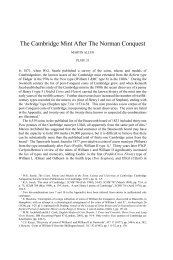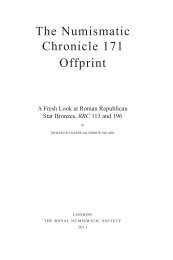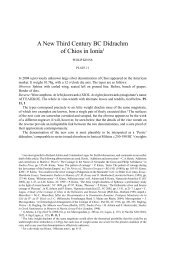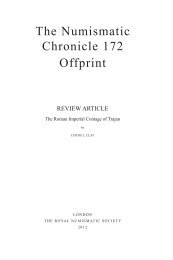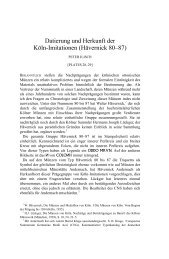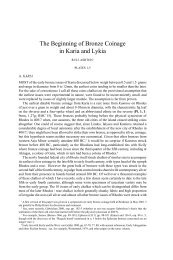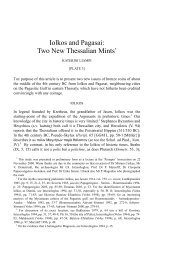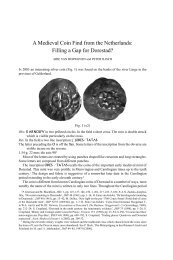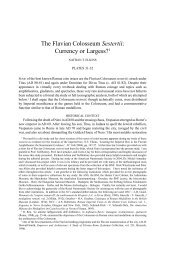The Numismatic Chronicle 171 Offprint - Royal Numismatic Society
The Numismatic Chronicle 171 Offprint - Royal Numismatic Society
The Numismatic Chronicle 171 Offprint - Royal Numismatic Society
Create successful ePaper yourself
Turn your PDF publications into a flip-book with our unique Google optimized e-Paper software.
384<br />
FRANÇOIS THIERRY<br />
was submission; as man and son, his aim was fi lial piety; as man and father, his aim<br />
was affection’ (wei ren jun zhi yu ren, wei ren chen zhi yu jing, wei ren zi zhi yu xiao,<br />
wei ren fu zhi yu ci 為人君止於仁,為人臣止於敬,為人子止於孝,為人父止<br />
於慈). 108<br />
26. 賢賢,親親,樂樂,利利 Hiền hiền, thân thân, lạc lạc, lợi lợi<br />
Ch. Xian xian, qin qin, le le, li li // Appreciate the wise, love one’s parents, enjoy<br />
pleasure, benefi t from gain.<br />
Inscription found on coins of the Minh Mạng, 109 Thiệu Trị110 and Tự Đức111 eras. On<br />
coins of the Minh Mạng era, the inscription appears in the form 賢ㄑ親ㄑ樂ㄑ利ㄑ.<br />
<strong>The</strong>se eight characters are a contraction of a passage in <strong>The</strong> Great Learning citing<br />
the Shijing: ‘<strong>The</strong> Shi[jing] says: Oh! <strong>The</strong> old kings are not forgotten. <strong>The</strong> princes<br />
appreciate the wise, and love their parents; the lesser people enjoy their pleasures<br />
and benefi t from their gains’ (Shi yun. Yuxi! Qian wang bu wang. Junzi xian qi xian,<br />
er qin qi qin, xiaoren le qi le, er li qi li 詩云。於戲。前王不忘,君子賢其賢而<br />
親其親,小人樂其樂而利其利). 112 <strong>The</strong> fi rst two characters are found in the Lunyu<br />
in a more developed form: ‘appreciate wisdom over pleasure’ (xian xian yi se 賢賢<br />
易色); 113 and a similar version is found at the end of the fourth chapter of <strong>The</strong> Great<br />
Learning. 114 <strong>The</strong> expression ‘love one’s parents’ (qin qin) is found many times in the<br />
Doctrine of the Mean. See also type 35.<br />
27. 國泰民安,風調雨順 Quốc thái dân an, phong điều vũ thuận<br />
Ch. Guo tai min an, feng diao yu shun // <strong>The</strong> state calm, the people at peace, the<br />
wind gentle, the rain benefi cial.<br />
Inscription found on coins of the Minh Mạng (Fig. 6) 115 and Thiệu Trị (Fig 7) 116 eras.<br />
This inscription is not found with the niên hiệu Tự Đức because the character An 安<br />
was made taboo in 1861 (see above).<br />
108 Daxue, III, p. 8. Legge (Four Books, p. 318) translates this as ‘As a sovereign, he rested in<br />
benevolence. As a minister, he rested in reverence. As a son, he rested in fi lial piety. As a father, he<br />
rested in kindness.’<br />
109 Lacroix, Numismatique annamite, no. 426; Schroeder, Annam. Etudes numismatiques, no. 129;<br />
AMM, no. V70; CMV, no. 1528; Barker, Historical cash coins of Viêt Nam, no. 140.<br />
110 CMVS, no. 428.<br />
111 CMV, no. 1792.<br />
112 Daxue, III, pp. 9–10. Legge (Four Books, p. 320) translates this as ‘In the Book of Poetry, it is said,<br />
“Ah! <strong>The</strong> former kings are not forgotten.” Future princes deem worthy what they deemed worthy, and<br />
love what they loved. <strong>The</strong> common people delight in what delighted them, and are benefi ted by their<br />
benefi cial arrangements.’<br />
113 Lunyu, I-7, p. 73. Legge (Four Books, p. 6) translates this as ‘If a man withdraws his mind from<br />
the love of beauty, and applies it as sincerely to the love of the virtuous…’<br />
114 Daxue, IV, pp. 9–10.<br />
115 Schroeder, Annam. Etudes numismatiques, no. 130; AS, III, p. 11; CMV, no. 1533. Barker, Historical<br />
cash coins of Viêt Nam, no. 142.<br />
116 CMV, no. 1629.



